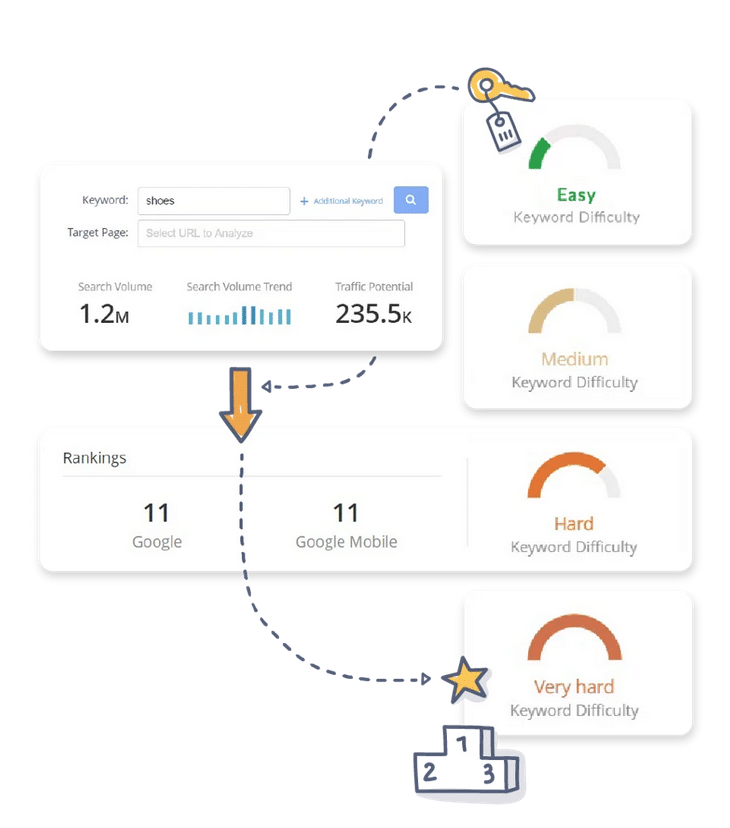
In a pioneering move within the world of AI-driven SEO innovations for enterprises, seoClarity has unveiled its latest AI development, the Keyword Difficulty score—an invaluable tool for SEO professionals seeking to gauge the ranking difficulty of any given keyword.
This breakthrough technology, which has been meticulously crafted over the course of three years, centers around seoClarity’s innovative Page Strength metric. Unlike traditional backlink-counting models, Page Strength offers a comprehensive assessment of a page’s topical relevance, fundamentally altering the way SEO professionals approach keyword difficulty assessment.

Say goodbye to antiquated backlink-centric models with outdated keyword difficulty checkers.
seoClarity has introducted Page Strength—an AI-powered algorithm that leverages a groundbreaking amalgamation of metrics, billions of data points, and over 6 years of historical ranking data. It gauges the topic relevance in comparison to other ranking pages, offering unparalleled accuracy in keyword difficulty assessment.
Mitul Gandhi, Co-founder, and Chief Architect of seoClarity, elaborated on the uniqueness of the approach: “seoClarity’s approach is significantly different and takes into account everything known about a page to create a composite score called Page Strength.”
Page Strength harnesses the full potential of seoClarity’s Research Grid dataset, encompassing keywords, search volume, volatility, SERP features, backlinks, and, most critically, on-page content. With the aid of advanced AI algorithms, it computes the page strength of tens of billions of pages across 90+ countries.

Gandhi highlighted the decline in the effectiveness of backlink-centric approaches: “Existing approaches to determining page strength and keyword difficulty using backlinks have shown declining correlation to rankings over the years.” A recent study demonstrated a meager correlation of 0.233.
In stark contrast, seoClarity’s Page Strength boasts a remarkable 0.51 correlation to rankings and has been rigorously validated through third-party statistical studies—an achievement unmatched by any other SEO metric.
While the SEO industry has historically relied heavily on backlinks as a primary factor for assessing keyword difficulty, search engines have evolved significantly. As Duy Nguyen from Google’s Search Quality Team noted, “Backlinks as a signal have a much less significant impact compared to when Google Search first started out many years ago.” Gary Illyes further emphasized that links are not among the top three ranking factors.
Mark Traphagan, seoClarity’s VP of Training and Product Marketing, emphasized the importance of this release: “Given the limitations of the ‘link factor’ approach, Page Strength as the focus for Keyword Difficulty provides a clear and actionable metric for prioritizing topics.”
Niall Brooke, Ecommerce SEO Manager for Matalan, a leading UK and International omni-channel retailer, praised the innovation: “There’s a lot more that goes into how difficult a keyword is to rank for these days; having a complex algorithm worked out for you is really beneficial and a big time-saver.”
Existing clients can readily access Keyword Difficulty across seoClarity’s platform, including Research Grid, Topic Explorer, and Content Fusion.
For those looking to elevate their SEO analysis, seoClarity offers the opportunity to experience the industry’s best. Sign up for a demo today and witness how seoClarity’s Keyword Difficulty surpasses other tools, providing clarity and precision in SEO prioritization.
This article was written by AI and edited by Bill Hartzer.